Category: Buses

NLB posts $9m loss on Covid-19 impact
The New Lantao Bus Co (NLB) has recorded a HK$9 million annual loss as a result of plunging passenger numbers caused by the coronavirus.
NLB’s parent company, Kwoon Chung Bus Holdings, said revenue “dropped drastically in February and March,” widening the annual loss.
It said it expects a loss in the 2020-21 financial year as well.
Besides the sharp fall in passengers on Lantau bus routes, NLB was also forced to suspend its recently-opened shuttle services to the HK-Macau bridge.
Kwoon Chung does not disclose details of its NLB operations, but says the business usually runs at a loss or a narrow profit.
It said it expects NLB to operate in the red “in the coming financial year as fare increase [sic] is not likely to be approved anytime soon and the group has to rely on the subsidy offered by the government to maintain a positive cash flow position.”
Kwoon Chung said net profit for 2019-20 was HK$22 million, down 92% from the previous year, and revenue of HK$2.463 billion was 17% lower.
NLB was forced into an embarassing climbdown in March after trying to slash its Lantau services without Transport Department permission.
It apologised for several days of chaos in which buses ran at irregular intervals, but said it would still pursue cuts to services.

NLB apologises over timetable fiasco but vows to pursue cuts
New Lantao Bus (NLB) has apologised over the chaos created by its misjudged attempt to cut services, but says it will continue to seek timetable changes.
The company angered local residents during several days of disarray this week when buses ran at irregular intervals after the new timetable was blocked.
The new schedule, due to take effect last Friday, was blocked by the Transport Department because it had not been approved.
NLB formally withdrew the changes but for the next four days buses ran at unpredictable times. Passengers were unable to get clear answers from NLB and the company’s website and mobile app contained little or no information.
In a statement on its website posted Wednesday the company said:
We apologize for any inconvenience caused by any discrepancies between the timetable and the actual departure times over recent days and would like to assure our passengers that such anomalies have now been rectified.
But it added that “it is essential that we effect reasonable bus service adjustments so as to allow the company to improve its current financial performance.”
It said the coronavirus outbreak had caused a 50% drop in passenger numbers and “a prolonged period of financial loss.”
The NLB’s proposed timetable eliminated the no.4 service between Tong Fuk and Mui Wo and slashed the no. 1 service between Tai O and Mui Wo and the no. 2 bus serving Ngong Ping. It made smaller changes to the 3M, 11 and 23 services.
NLB said it had applied to the Transport Department, but did not explain why it would not wait for approval before implementing the new schedule.
The bus company operates service under a licence from the Transport Department, which requires it to hold regular public consultations with passengers and to seek approval for any changes in schedules.
The company has not responded to Lantau News queries.
Local activists including Legco member Eddie Chu staged a protest at the Central government offices in Admiralty on Tuesday. They handed a petition to a Transport Department official.
They have called a public meeting for Friday evening at Mui Wo Ferry Pier to discuss the planned service cuts.
Eddie Tse, head of the Tai O Sustainable Development Education Workshop, said residents had been badly confused by the attempted timetable change.
“Even the station masters and drivers were not clear about the schedule,” he told Apple Daily.

Reprieve: Govt halts ‘unapproved’ Lantau bus timetable cuts
New Lantao Bus Co. (NLB) has backed down – for now at least – on planned cuts to Lantau bus services.
Last week it announced the elimination of nearly a third of no. 1 bus services, most of the no. 2 buses and the entire no. 4 service.
The company said the cuts were necessary because of the fall in passengers as a result of the coronavirus .
But in a confusing chain of events, the reduced timetable, due to start Friday, was halted by the Transport Department.
NLB had announced the new timetable on its website last week and also advised South Lantau district councillor Randy Yu, who reported it on his Facebook page.
The company updated its timetables and mobile app on Friday to reflect the changes.
Yet the buses continued to follow the old timetable after the Transport Department warned NLB that it could not make changes without approval, according to Apple Daily
The department sent inspectors to Tung Chung, Mui Wo and Tong Fuk on Friday morning to ensure services were keeping to the established timetable.
(At time of writing, both the NLB online timetable and the mobile app show the no. 4 Mui Wo-Tong Fuk service as restored, but all other buses running under the unapproved timetable.)
Eddie Tse, head of the Tai O Sustainable Development Education Workshop, said NLB could be in breach of its licence by changing schedules without Transport Department permission.
He said on Facebook the coronavirus outbreak was actually bringing more tourists to South Lantau on weekdays, “so why not increase rather than reduce [service]?”
While Lantau commuters might breathe a sight of relief, the Transport Department said it is still reviewing NLB’s proposal to cut services.
Randy Yu, who initially expressed no opinion on the cuts, said on his Facebook page today he was “extremely dissatisfied” over NLB’s “chaotic” handling of timetable changes.
“We have expressed our strong opposition to the Transport Department and to NLB,” he said.

Lantau bus services slashed as virus takes toll
Lantau bus services have been cut as a result of the coronavirus – and the changes may be permanent.
New Lantao Bus Co. has curtailed services across all routes, effective Friday March 13, the company has announced.
The biggest reductions are on South Lantau routes. The weekday no. 1 Tai O to Mui Wo bus has been slashed from 30 to 22 daily services, the no. 2 from Mui Wo to Ngong Ping has gone from 11 to four trips and the no. 4 bus from Tong Fuk has been shut down altogether.
In other changes, the Mon-Sat 3M service from Mui Wo to Tung Chung has been reduced from 50 daily trips to 45, while the 11 Tai O to Tung Chung bus has been trimmed from 58 to 56 services.
NLB said the changes were due to the “drop in patronage” during the virus outbreak.
While it said it would “closely monitor” passenger numbers it made no commitment to restoring the cut services after the contagion is contained.
The company, owned by Kwoon Chung Bus, has said it makes a small profit or a loss on most of its South Lantau routes.
The new timetables:
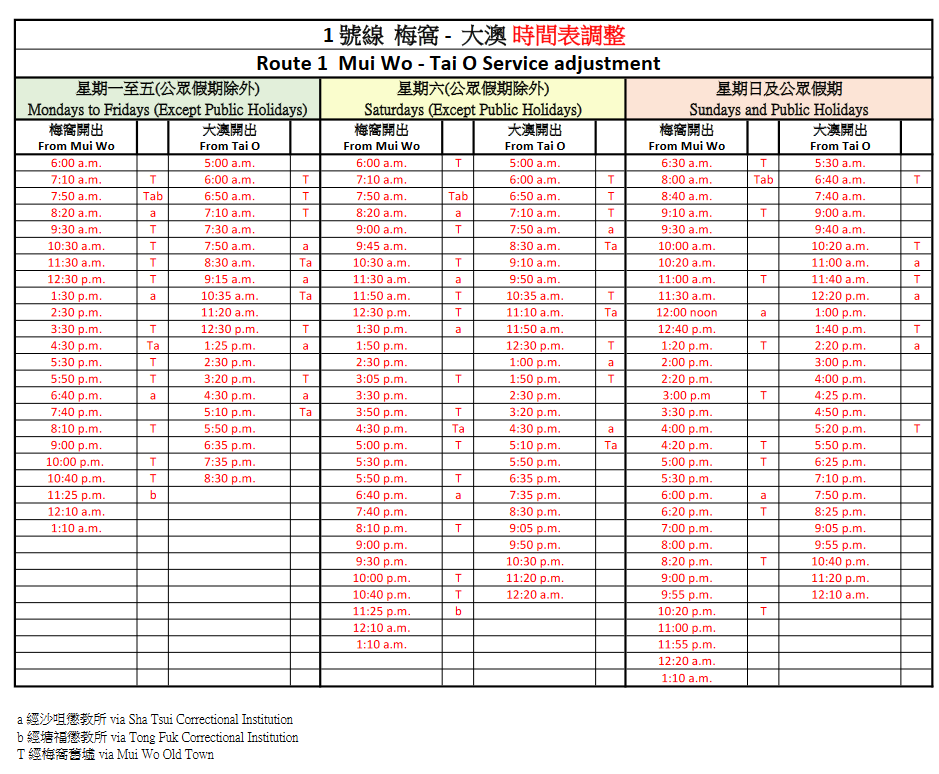
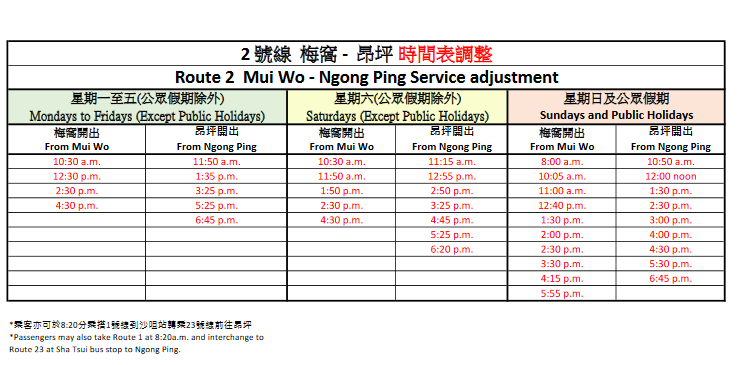
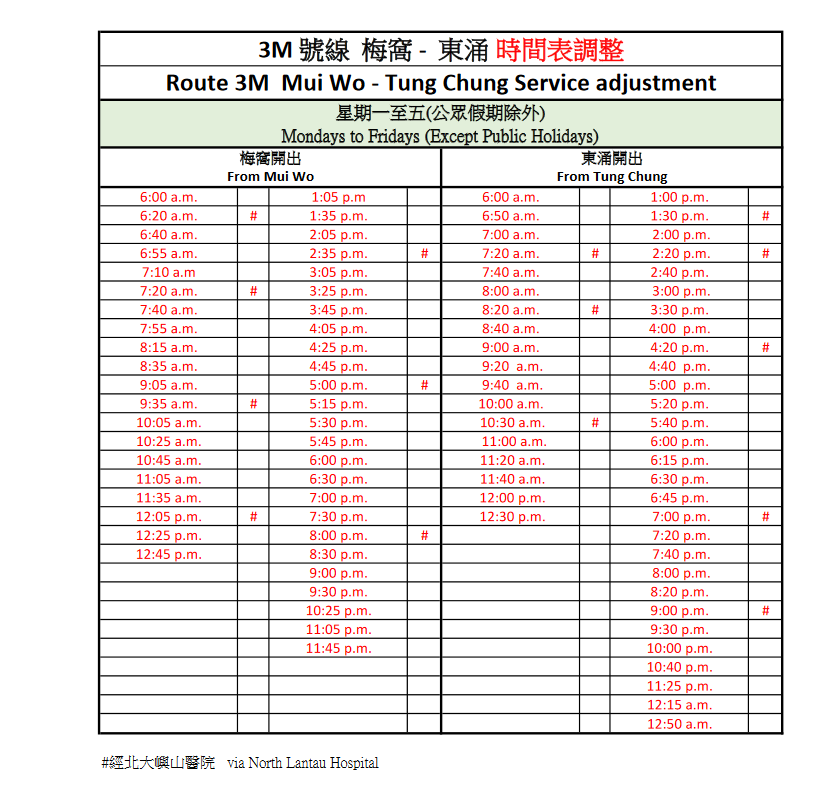
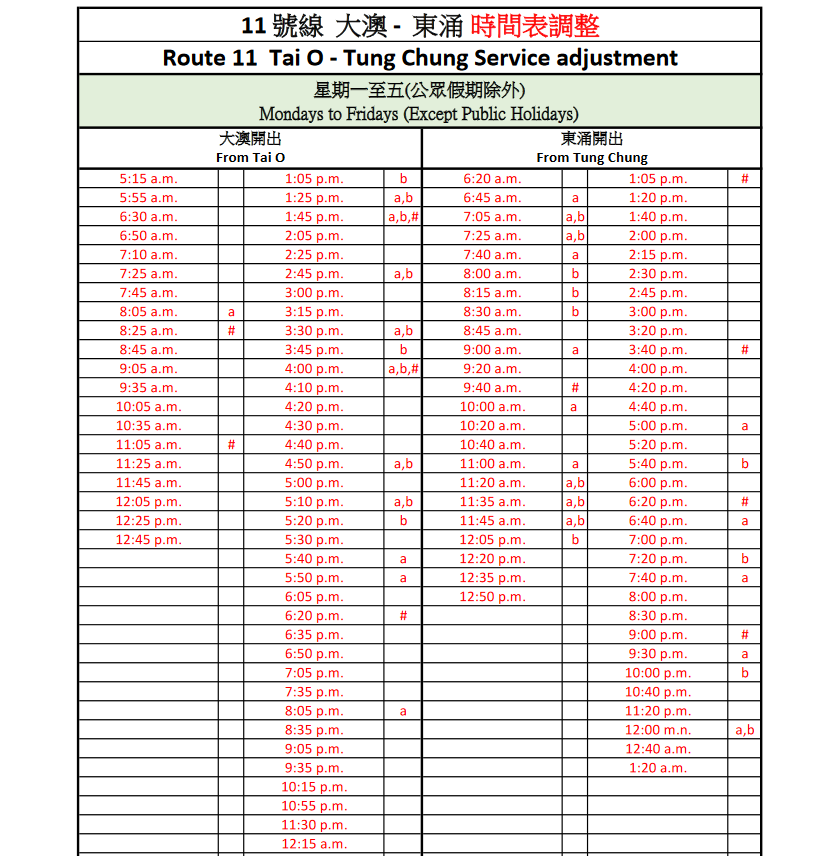
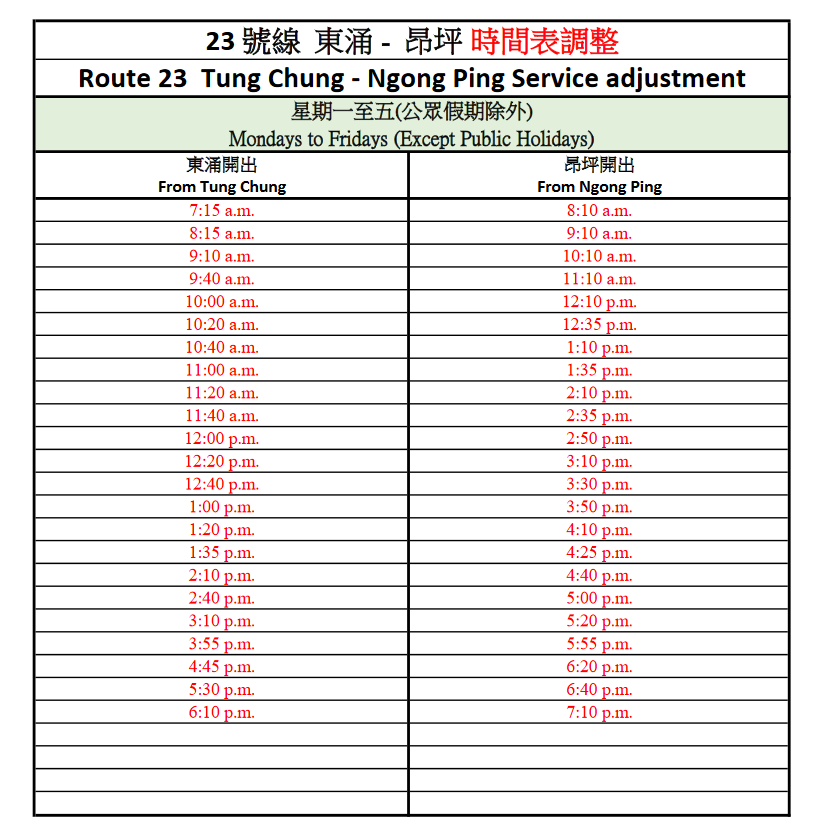

Election ’19: Fung Siu Yin, reform candidate
Fung Siu Yin is the challenger in Sunday’s district council poll and a part of a new face in local politics.
Standing for the Lantau seat, she is pro-democratic, green and a member of a new group called Islands Connect, which is ensuring that for the first time democrats contest seats in all four islands in the district.
Fung, 33, has lived in Tung Chung for 20 years. She has worked as a Legco research assistant for the past eight years, and is currently on Eddie Chu Hoi-dick’s staff.
She opposes Lantau Tomorrow Vision, which she says has had scant scrutiny from the council. If elected she would call public hearings across Lantau to debate the project.
She has also done a good deal of work on public transport issues, finding that South Lantau residents object to the Sunday fare hikes and want to see more frequent services of both bus and ferry.
Having spent her early career working on senior and social welfare issues, she also advocates expanding community centres and medical services for the elderly and wants to set aside land for a retiree-run community farm.
The vacant Mui Wo high school, the wetlands and the Mui Wo improvement works are also high on her agenda.

Here is a condensed version of Lantau News’ interview with Siu Yin.
Why are you running for District Council?
I have lived in Tung Chung for about 20 years. In 2014 I knew we had big developments coming into Lantau. From that we tried to have some education and oral history documentation to tell people what would happen.
In 2018, the Lantau Tomorrow Vision was announced. In those four years, I had learnt more about Lantau people, and we know more about their needs. There were many problems with elderly citizens, and some education needs.
In our group, Save Lantau Alliance, we discussed the elections and we wanted to have a role, to have more debate in the community to talk about what we want for Lantau’s future. That’s why we are running for election this year.
How do you see the role of the district council?
They get a lot of information from the government, and the government often consults with them on education, bus services, medical services, etc.
The councillors also can vote for the chief executive and one of them can be elected to Legco. They can meet with different government departments, they can share their ideas. They have many ways to work with the government.
You talk about reforming the district council. What would you do?
The Islands District Council has 18 members, including eight ex officio. So many people don’t have a voice. So we want to open a platform. We want the residents in the Lantau community, who care about the community, they can voice out.
For example, the bus company wanted to increase bus fares. They just informed the district council but most Lantau people didn’t know. In May we did a street survey. We found more than 68% of people didn’t know the bus company was applying to increase the fare.
We will have social media channels, like Facebook or WhatsApp. Give people many channels to share their opinions. We think if the district councils are working, then there will be less anger in the community.
Can district councils do anything to address the current political crisis?
We can open many forums to discuss what people are ask for. Is it reasonable or not reasonable, what is the meaning of the five demands, and so on. Because now you are blue, I am yellow, we are totally divided into two colours and we don’t want to talk to each other. It’s not a healthy relationship.
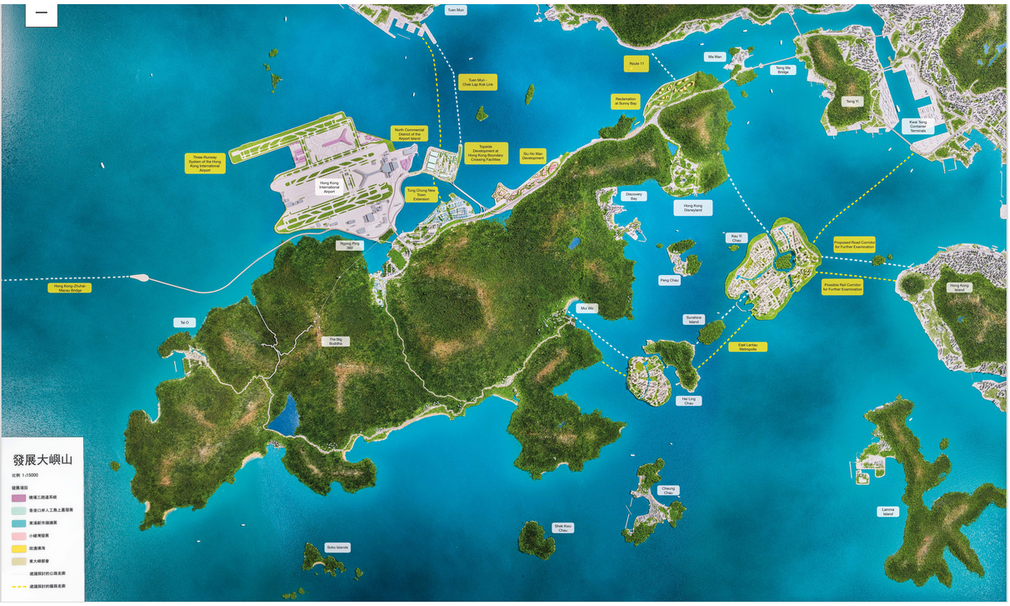
Lantau Tomorrow Vision is a huge project and the government seems determined to build it. What can you do in the district council?
The district council talked about Lantau Tomorrow Vision just once, for one or two hours, and then a show of hands.
If we can get to District Council, we will have an agenda item to discuss Lantau Tomorrow Vision. We want to have a public hearing. It’s not local to Central, so we will have public hearings in Lantau – in Mui Wo, Tai O, and so on, and we can hear people’s opinions.
How to help Lantau’s senior population?
Lantau has a population of about 24,000, of which about 7,000-8,000 are over 50. But we have just one elderly home in Mui Wo. Two years ago, the home in Tai O closed.
The medical system is very important for them. We have just two clinics, with a limited service level, in Mui Wo and Tai O. It’s not enough. Also in Mui Wo the population has risen to more than 6,000. That’s why we ask the clinic employ two doctors, now just one.
We ask for community support service for the elderly. Some of them need help in cooking and cleaning, so they can live in their homes. We would like to set up community care services where they go to people’s homes, help cook and clean.
We also need community centres for the elderly, where they can read newspapers, sing together, have some health checks.
Right now we have a small centre in Mui Wo. In Tai O – nothing. In South Lantau – zero. NGOs provide services from Tung Chung, but that’s not reasonable. So that is why we hope to have centres in South Lantau and Tai O.
Also, elderly people feel bored. They say they would like to have a community garden. They know how to farm. They can raise chickens; chickens can eat waste food that humans won’t eat.
They can provide value in return – food, recycling, education for young people as well. So they become teachers. It’s more positive, right?

What is the status of the Mui Wo school?
The school [the New Territories Heung Yee Kuk Southern District Secondary School] has been closed for 12 years. We want to re-use the school for the elderly services, medical service and also education services – for kindergarten, primary school – so it is not wasted.
In the last few months we have had communication with the residents. Many of the Mui Wo kids are under six years old. They are going to Tai O, Tung Chung or Tsuen Wan for kindergarten. We see here is a need in the community. We have an empty school – it’s a perfect match.
You have done some work on public transport issues. What have you found?
Two months ago we did a survey and held a forum.
For buses, the most important thing people are concerned about is service frequency. People also worry about the safety of the double decker buses. On the upper deck most of them don’t have seat belts. There’s no room for luggage upstairs, either, so they have to put their suitcases in the aisle. It’s dangerous.
For both bus and ferry, people want to cancel the extra charge for public holidays and Sundays. They think it’s not reasonable.
The government gives subsidies to ferry companies. We want to improve transparency and open up the financials of the ferry companies so we know how they are spending the subsidies.
People also care about frequency. We need more ferries at peak times. The bus and ferry companies and residents don’t have the chance to communicate. District council members can create a platform for us to talk – we can hold a meeting once every two months.
The government has made promises over the Pui O wetlands but has done nothing. How can you help protect the wetlands?
We have a law to protect the South Lantau wetlands and also to protect the buffalo. Two years ago the government agreed to update the law, but this year the Chief Executive Policy Address again failed to mention it.
I think district council members can raise this issue again.
In South Lantau and Mui Wo, we have different parties. One will love and care about the environment. They know the ecosystem is very important for the community. The second – they want more development. They have the intention to destroy the wetlands. They also have the intention to move the buffalo and cows.
The first party includes many of the residents. They love the buffalos and love the wetland, but they are scared to speak out. If district council members can collect people’s ideas about the wetlands and how to deal with problems of the buffalo and try to find a way to form a community consensus.
Also we have connections with the FEHD and the EPD, some of them are friends. We ask them what are the problems they face. Resources? Manpower? Rural party problems? We want to know what the problems are and try to find a way to protect the wetland and the buffalos.
I think education is very important. We have some residents who know a great deal about the cattle and buffalo and are willing to share. If more people know how to communicate with the animals and understand their behaviour, that will help.

What is the progress of the Mui Wo facelift?
They call it the Mui Wo improvement works. The first question is: improvements for whom? For tourists or residents?
When we saw the plan from 2017, we didn’t see improvement for residents. They moved the bicycle parking far away, and then moved the restaurants into the ferry pier building.
We collected some opinions. People really strongly disagree with moving the bike parking. It’s not convenient for them. But now the problem is not enough space. That’s why we have bicycles everywhere. So people suggest that we should extend the bike parking because more people are moving here.
So we asked the CEDD for more information. They told us the plan was made in 2017, but can change and they are considering changes. But they don’t think it will happen immediately – maybe it might take another five or ten years to finalise this stage.
For the residents we think that is good, so we have more time to discuss what we need. Hopefully more time to debate and more time for them to change their plan so it works for residents, not just tourists.

New double-decker bus to run on 3M route from Q3
This is the new double-decker bus that will run between Tung Chung and Mui Wo, starting in the third quarter.
New Lantao Bus Co (NLB), which released the photo this week, says the new bus can carry 88 passengers, up 40-50% from existing single-deck vehicles.
The buses are timed to come into service after residents start moving into the new HOS apartments in Mui Wo, NLB says.
The two HOS estates are expected add approximately 2,000 people to Mui Wo’s population of 5,400.
NLB has ordered ten air-conditioned low-floor vehicles to run on the 3M route.
Each bus can carry 47 passengers on the upper level and 41 seated or standing on the lower level.
The company says it ran trials in June 2016 and November 2017 – in the latter testing it out on the entire 3M journey.
The 3M is the only public transport link between Mui Wo and Tung Chung and is severely crowded during rush hour periods.
But the Transport Department (TD) says the current service has “roughly” enough capacity to support demand.
In a paper submitted to the Islands District Council last October, it said that according to a survey, hour the highest level of bus occupancy at peak hour was 81% in the Mui Wo direction and 88% in the Tung Chung direction.
The TD says the new buses will be equipped with a closed-circuit TV and a ‘black box’ so NLB can monitor the condition of the dirver and the bus operation for safety purposes.
It says fare, route and frequency on the 3M route will remain unchanged after the introduction of the double-deckers.
It is not the first time double-decker buses have run on Lantau roads.
Prior to the construction of the Tsing Ma Bridge in 1997, two-decked buses used to run between Mui Wo and Tong Fuk to carry passengers to and from the ferry pier.

HZM Bridge bus rides for $80, once it opens
The bus ride across the HZM Bridge will cost just as little as HK$80 – but the bridge may not open until the second half of the year.
Shun Tak, the main HK-Macau ferry operator, is part of a consortium that has won the exclusive rights to run the bridge shuttle service, SCMP.com reports.
Managing director Pansy Ho, daughter of the gambling king Stanley Ho, told a results announcement this week the consortium include Hong Kong-Zhuhai-Macau Land Transportation (Macau), Zhuhai Yuegong Xinhai Transportation Co., and Hong Kong Zhuhai Macau Bridge Shuttle Bus Services.
According to the Post:
Between 90 and 140 buses will run daily between the border checkpoints of the three cities. They will depart every five minutes at peak hours and every 10 to 15 minutes in non-peak hours. A night service will see buses leaving every 15 to 30 minutes.
The HK$80 fare to Zhuhai is much lower than the HK$220 ferry and HK$130 coaches using other routes.
But the shuttle will be just one of many buses crossing the bridge.
Hong Kong bus operators, including Kwoon Chung, the owner of the New Lantao Bus Co., are tipping HK$170 million into cross-border services. They are planning to run luxury coaches with free Wi-Fi and smartphone charging.
Freeman Cheung Kim-ping, the secretary-general of the Hong Kong-Guangdong Boundary Crossing Bus Association, told the Post that many passengers will prefer services that go direct to the city centre.
Coaches take passengers from downtown areas such as Mong Kok directly to Zhuhai and even farther up north, while those who take the shuttle buses will need to travel on their own to the border control points.
But the services may not start for some time.
The Asia Times reports that the preferred opening date is now July 1, the anniversary of founding of the SAR – but even that may be too ambitious.
An un-named official said the Hong Kong side needed to speed up road-surfacing work as well as complete construction of boundary crossing facilities, in order to meet the July 1 deadline.
Another report last week said the opening would be delayed past the current target date of May because of “serious” problems in the foundations of the artificial island in Tung Chung Bay.

Bus safety probe gets underway, seeks public submissions
A panel investigating the safety of Hong Kong bus services was formally established today.
The three-member committee, chaired by Justice Michael Lunn, will examine “from the point of view of safety” the operation and regulation of franchised buses.
The inquiry has been set up in the wake of the Tai Po accident in February that killed 19 people – the city’s worst accident in 15 years.
Justice Lunn said in a statement the committee was seeking submissions from the public as well as those involved in the industry.
The focus will likely be on the two big bus operators, KMB, whose vehicle was involved in the Tai Po crash, and Citybus.
KMB has a fleet of 3,920 and carries 2.7 million passengers daily. while Citybus runs 946 buses and carries 620,000 people each day.
New Lantao Bus, the smallest of the franchised operators, has 121 vehicles and carries 72,000 daily.
However, NLB buses have been involved in a series of minor accidents in recent years on the island’s steep hills and sharp bends.
Its management are usually among the strongest opponents of proposals to increase or enforce local speed limits.
The company is reportedly being sued by the family of a man who died after being struck by a no 34 mini-bus operated by NLB two years ago.
The inquiry invites those involved in the Tai Po and “other recent serious incidents involving franchised bus services, along with members of the public generally,” to make written submissions by April 30.
Details are on the committee website.

Randy Yu calls for double-decker bus review in wake of Tai Po crash
District Council vice chair Randy Yu has called on the Transport Department to review the safety of double-decker buses on Lantau roads before they are introduced later this year.
He said the Tai Po crash last month had stirred residents’ concerns about the safety performance of the new low-floored double-decker bus
Yu, who represents South Lantau, said the council had agreed that the new bus be launched on the 3M route after residents start moving into the Mui Wo HOS developments in August.
But the Tai Po accident, in which 19 people died, “once again raised concerns about the safety of double-decker buses on the 3M route,” Yu said in a question tabled for the Traffic and Transport Committee meeting next week.
“Given the special road environment on Lantau Island, residents in this district are concerned that double-decker buses may not be able to protect the safety of passengers,” he said.
He called on the Transport Department to road-test the new bus on the 3M route – between Tung Chung and Mui Wo – and report to the council on the results.
Another councillor, Amy Yung, the representative for Discovery Bay, called on the Transport Department to answer questions about the safety of the Discovery Bay-Tung Chung bus service.

Lantau bus drivers to get shorter shifts – next year
Lantau bus drivers are to get shorter shifts and longer breaks in the wake of the Tai Po bus disaster – but it may take more than a year.
Under new Transport Department guidelines, the maximum length of a driving shift has been reduced from 11 to 10 hours and rest breaks have been increased from 30 to 40 minutes.
Additionally, the maximum time on shift, including driving time and breaks, must be cut from 14 to 12 hours, drivers are to be allowed at least 22 hours in off-duty breaks every three successive shifts.
Nineteen people died and 65 were injured in the February 10 crash, in which a KMB bus overturned on Tai Po Road.
In a statement issued February 23, the New Lantao Bus Co “expressed its support and active cooperation” with the new rules.
“We will communicate with the bus captains as soon as possible and discuss the timing and details of the implementation of the new guidelines.”
The company said it would “endeavor to maintain existing services” while implementing the new rules.
It has plenty of time to do so, however. The new rules, which apply to all franchiced bus operators, do not have to be introduced until the second quarter of 2019.
But the reduction in driver shift times adds further financial pressure on NLB, a subsidiary of listed company Kwoon Chung Bus Holdings.
The Transport Department told it to cut costs after a “not satisfactory” first-half financial result three months ago. The new rules now introduce a further layer of costs.
